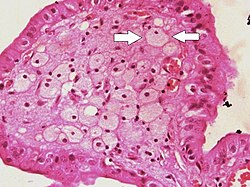Cholesterolosis of gallbladder

Editor-In-Chief: Prab R Tumpati, MD
Obesity, Sleep & Internal medicine
Founder, WikiMD Wellnesspedia &
W8MD's medical weight loss NYC, sleep center NYC
Philadelphia medical weight loss and Philadelphia sleep clinics
| Cholesterolosis of gallbladder | |
|---|---|

| |
| Synonyms | Strawberry gallbladder |
| Pronounce | N/A |
| Specialty | N/A |
| Symptoms | Often asymptomatic, may include abdominal pain, nausea, vomiting |
| Complications | Cholecystitis, gallstones |
| Onset | Usually in adults |
| Duration | Chronic |
| Types | N/A |
| Causes | Accumulation of cholesterol esters in the gallbladder wall |
| Risks | Obesity, hyperlipidemia, diabetes mellitus |
| Diagnosis | Ultrasound, endoscopic ultrasound, histopathology |
| Differential diagnosis | Cholelithiasis, adenomyomatosis, gallbladder polyps |
| Prevention | Healthy diet, weight management |
| Treatment | Cholecystectomy if symptomatic |
| Medication | N/A |
| Prognosis | Good with treatment |
| Frequency | Common |
| Deaths | N/A |
Cholesterolosis of gallbladder is a pathological condition characterized by the accumulation of cholesterol within the mucosal cells of the gallbladder. This condition is often associated with gallstones, but can occur independently.
Etiology[edit]
The exact cause of cholesterolosis of gallbladder is not well understood. However, it is believed to be related to abnormalities in the metabolism of cholesterol in the body. Some studies suggest that it may be associated with high levels of cholesterol in the blood, obesity, and a diet high in fat and cholesterol.
Pathophysiology[edit]
In cholesterolosis of gallbladder, cholesterol is deposited in the lamina propria of the gallbladder wall. This leads to the formation of yellowish spots or patches, which are often described as "strawberry gallbladder" due to their appearance. The accumulation of cholesterol does not cause inflammation or damage to the gallbladder tissue, but it can lead to the formation of polyps or gallstones.
Clinical Presentation[edit]
Patients with cholesterolosis of gallbladder may be asymptomatic or may present with symptoms similar to those of cholecystitis, such as abdominal pain, nausea, and vomiting. The condition is often discovered incidentally during imaging studies or surgery for other conditions.
Diagnosis[edit]
The diagnosis of cholesterolosis of gallbladder is usually made based on the characteristic appearance of the gallbladder on imaging studies, such as ultrasound or computed tomography (CT) scan. The definitive diagnosis is made by histological examination of the gallbladder tissue obtained during surgery.
Treatment[edit]
The treatment of cholesterolosis of gallbladder is usually conservative, as the condition is often asymptomatic and does not cause complications. However, in cases where the condition is causing symptoms or complications, cholecystectomy (surgical removal of the gallbladder) may be indicated.
Prognosis[edit]
The prognosis of cholesterolosis of gallbladder is generally good, as the condition does not cause significant morbidity or mortality. However, patients with this condition may have an increased risk of developing gallstones.
Gallery[edit]
-
Histopathology of cholesterolosis with annotated foam cell
-
Gallbladder cholesterolosis micro
-
Gallbladder cholesterolosis intermediate magnification
-
Gallbladder cholesterolosis intermediate magnification cropped
Ad. Transform your life with W8MD's Budget GLP-1 injections from $75


W8MD offers a medical weight loss program to lose weight in Philadelphia. Our physician-supervised medical weight loss provides:
- Weight loss injections in NYC (generic and brand names):
- Zepbound / Mounjaro, Wegovy / Ozempic, Saxenda
- Most insurances accepted or discounted self-pay rates. We will obtain insurance prior authorizations if needed.
- Generic GLP1 weight loss injections from $75 for the starting dose.
- Also offer prescription weight loss medications including Phentermine, Qsymia, Diethylpropion, Contrave etc.
NYC weight loss doctor appointmentsNYC weight loss doctor appointments
Start your NYC weight loss journey today at our NYC medical weight loss and Philadelphia medical weight loss clinics.
- Call 718-946-5500 to lose weight in NYC or for medical weight loss in Philadelphia 215-676-2334.
- Tags:NYC medical weight loss, Philadelphia lose weight Zepbound NYC, Budget GLP1 weight loss injections, Wegovy Philadelphia, Wegovy NYC, Philadelphia medical weight loss, Brookly weight loss and Wegovy NYC
|
WikiMD's Wellness Encyclopedia |
| Let Food Be Thy Medicine Medicine Thy Food - Hippocrates |
Medical Disclaimer: WikiMD is not a substitute for professional medical advice. The information on WikiMD is provided as an information resource only, may be incorrect, outdated or misleading, and is not to be used or relied on for any diagnostic or treatment purposes. Please consult your health care provider before making any healthcare decisions or for guidance about a specific medical condition. WikiMD expressly disclaims responsibility, and shall have no liability, for any damages, loss, injury, or liability whatsoever suffered as a result of your reliance on the information contained in this site. By visiting this site you agree to the foregoing terms and conditions, which may from time to time be changed or supplemented by WikiMD. If you do not agree to the foregoing terms and conditions, you should not enter or use this site. See full disclaimer.
Credits:Most images are courtesy of Wikimedia commons, and templates, categories Wikipedia, licensed under CC BY SA or similar.
Translate this page: - East Asian
中文,
日本,
한국어,
South Asian
हिन्दी,
தமிழ்,
తెలుగు,
Urdu,
ಕನ್ನಡ,
Southeast Asian
Indonesian,
Vietnamese,
Thai,
မြန်မာဘာသာ,
বাংলা
European
español,
Deutsch,
français,
Greek,
português do Brasil,
polski,
română,
русский,
Nederlands,
norsk,
svenska,
suomi,
Italian
Middle Eastern & African
عربى,
Turkish,
Persian,
Hebrew,
Afrikaans,
isiZulu,
Kiswahili,
Other
Bulgarian,
Hungarian,
Czech,
Swedish,
മലയാളം,
मराठी,
ਪੰਜਾਬੀ,
ગુજરાતી,
Portuguese,
Ukrainian




